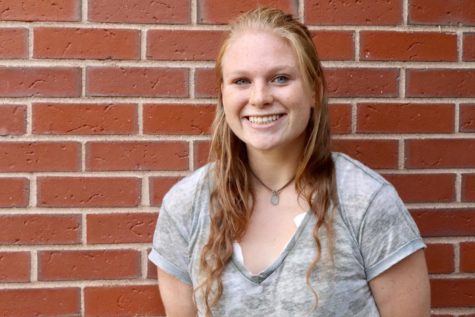National school shootings influence WHS policies
Credit: Caitlin Newton
Wayland High School practices the ALICE protocol to prepare students for emergency situations that people around the country are experiencing. “Such a strong part of our school is how tight our community is. Our goal is for students to feel connected to the school, [for] students to feel connected to their teachers, [for students to] feel they can share things with their teachers and [for students to] feel supported,” Principal Allyson Mizoguchi said.
May 29, 2019
Since shootings such as that at Marjory Stoneman Douglas High School in Parkland, Florida last year and more recently at Highland Ranch STEM school in Colorado, schools around the country have taken into consideration the revision of their policies regarding lockdowns and shelters.
Wayland High School has ALICE precautions installed in case of an intruder. ALICE is an acronym that provides steps to follow in a situation of an intrusion. It stands for Alert, Lockdown, Inform, Counteract and Evacuate.
“Unfortunately, [when] we [have to] hear about school violence or a school shooting, it brings us to a different level of reality on the importance of drilling for school emergencies,” Principal Allyson Mizoguchi said. “Unfortunately, because we hear about these tragic incidents, we take these drills more seriously.”
Students and faculty become more comfortable and aware of how to respond to a situation if they have practiced different scenarios. Mizoguchi emphasizes the importance of drills and how they help the school respond to threats.
“Every time we practice, we learn something new about our campus or about places where we need to do some more thinking about how to best respond to an emergency,” Mizoguchi said.
There are many specific situations that are unpredictable, but with each practice, a new solution is discovered. One difficult aspect is reducing the amount of noise created during the drills, and the students and faculty have learned how to better handle volume control through ALICE.
“From doing our practice, we learned that if there’s a lot of noise in the hallway, a shooter [could hear] that noise and [be] attracted or drawn to it,” Science teacher Jennifer McGuinn said. “They would turn around and go in the direction of where all [the] students were running through the hallway. I think you learn those little nuances of a situation that you wouldn’t without practice and you wouldn’t be prepared for or think about.”
One technique that ALICE drills allow students to practice is instinctive decision-making. Threats and dangerous situations are hard to anticipate, and the faculty believes it is important for students to be able to make a decision on the spot in a dangerous scenario.
“Our ALICE training gives you some choice so that you can kind of go with your instincts,” McGuinn said. “It’s really difficult to predict what you would do in that situation.”
Some teachers lock their doors on a regular basis, so in case of an intruder, it’s one less step they would have to execute.
“In case there’s a lockdown situation, the door’s always locked so we don’t have to take the time to lock the door,” Latin teacher Lee Krasnoo said. “It’s not always closed, but it’s always locked so in case of an emergency situation we don’t have to go and take the time to find the key and lock the door.”
While many of the teachers have not openly discussed the practice of locking their classroom doors, it is becoming more common as the faculty learn from each other and try to foresee their course of action for threatening situations.
“I think more and more teachers are doing it. We haven’t really talked about it, but I’ve heard more and more people mentioning they’re doing it that way now,” Krasnoo said.
Many faculty members have also learned from school shootings around the world that students themselves have a powerful voice when it comes to these situations.
“People have realized the power of students and how much they have to say and how much of an influence they can make on legislation and on what goes on in this country,” McGuinn said. “I think [this] empowers [students], which is really cool.”
The connection between students and faculty helps create a tight-knit community where everyone feels comfortable. This can allow members of the WHS community to handle threatening situations with a better mindset because they know they can count on those around them.
“Such a strong part of our school is how tight our community is. Our goal is for students to feel connected to the school, [for] students feel connected to their teachers, [for students to] feel they can share things with their teachers and [for students to] feel supported,” Mizoguchi said. “I think really cherishing and building on those relationships is actually one of the first lines of defense. We know each other, and when we feel like things are amiss, we tell someone, and we make sure we have enough support for everybody.”
The faculty are not the only members of WHS who are reflecting on school shootings and our own school safety. Many students have acknowledged what is going on around the world regarding school safety and the increase in awareness.
“I think [safety procedures] are just much more common,” senior Daniella Timperio said. “I think a lot more people are much more aware of them. I felt like when I was younger, lockdown drills weren’t a very common thing that we had done, or they weren’t taken as seriously, whereas now you think, ‘Wow, this is a situation which people have had to suffer through,’ which is really hard.”
Mizoguchi believes the best way we can prepare for unsafe situations is for everyone to treat drills as real-life scenarios and to understand how to respond to emergencies.
“I think the most important message for students is [for] when we do have opportunities for students to become prepared in responding to an emergency situation, [we] take those opportunities seriously,” Mizoguchi said. “[It’s] also [important] to trust the people around them, to trust the adults and then to continue to build those relationships so we can communicate openly and honestly with one another.”





![Last Wednesday, the Wayland School Committee gathered to discuss a number of topics regarding the health curriculum and Innovation Career Pathway course. Another large topic of conversation was the ways to potentially mitigate distracting cell phone usage. "These [phones] are going to distract your learning and social relationships," Superintendent David Fleishman said. "That's concrete right there."](https://waylandstudentpress.com/wp-content/uploads/2025/06/Screenshot-2025-06-04-at-9.49.31 PM-1200x886.png)























![Wayland High School practices the ALICE protocol to prepare students for emergency situations that people around the country are experiencing. “Such a strong part of our school is how tight our community is. Our goal is for students to feel connected to the school, [for] students to feel connected to their teachers, [for students to] feel they can share things with their teachers and [for students to] feel supported,” Principal Allyson Mizoguchi said.](https://waylandstudentpress.com/wp-content/uploads/2019/05/IMG_1156-XL-900x599.jpg)


